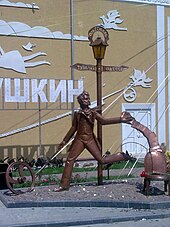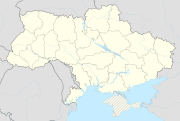Olhopil (Chechelnyk)
| Olhopil | ||
| Ольгопіль | ||

|
|
|
| Basic data | ||
|---|---|---|
| Oblast : | Vinnytsia Oblast | |
| Rajon : | Chechelnyk Raion | |
| Height : | no information | |
| Area : | 40.1 km² | |
| Residents : | 3,897 (2001) | |
| Population density : | 97 inhabitants per km² | |
| Postcodes : | 24830 | |
| Area code : | +380 4351 | |
| Geographic location : | 48 ° 12 ' N , 29 ° 30' E | |
| KOATUU : | 0525084401 | |
| Administrative structure : | ||
| Address: | вул. Центральна буд. 131 24830 с. Ольгопіль |
|
| Website : | Website of the locality | |
| Statistical information | ||
|
|
||
Olhopil ( Ukrainian Ольгопіль ; Russian Ольгополь Olgopol , Polish Olhopol ) is a village in the southeast of the Ukrainian Vinnytsia Oblast with about 3900 inhabitants (2001).

Olhopil is the only village of the 40.1 km² district council of the same name in the east of Chechelnyk Rajon .
The village is located in eastern Podolia on the banks of Sawran ( Саврань ), a 96 km long right tributary of the Southern Bug is 13 km east from Rajonzentrum Chechelnyk and 168 km southeast of the Oblastzentrum Vinnytsia . The regional roads P-54 and P-33 run through the village .
history
The village was first mentioned in writing in 1780. The valley of the Sawran was for a long time in the troubled Ukrainian border area between Poland-Lithuania and the Khanate of Crimea , so that people did not dare to settle here until the 17th century. As a result, the village was founded as "Rohuska-Chechelnyzka" ( Рогузка-Чечельницька ) as a property of the Polish aristocratic Lubomirski family. In 1793 the village fell to the Russian Empire , along with other areas of right-bank Ukraine . In 1812 Rohuska-Chechelnytska received the status of a city, as well as the name Olgopol after the granddaughter of Catherine the Great , the Grand Duchess Olga Pavlovna (* July 22, 1792, † January 26, 1795). Olhopil became the provincial capital of a Ujesd in the Podolia Governorate and in 1831 a market was opened here. On January 1, 1896, the village had 10,322 inhabitants. In 1923 the village lost its city status.
During the Second World War, the place belonged to Transnistria, which was annexed by Romania . A forced ghetto for the Jewish population was set up in the village, in which Jews from Bessarabia were also imprisoned. In March 1943, 724 people lived in the ghetto, a year later the place was conquered by the Red Army.
literature
- Olgopol , in: Guy Miron (Ed.): The Yad Vashem encyclopedia of the ghettos during the Holocaust . Jerusalem: Yad Vashem, 2009 ISBN 978-965-308-345-5 , pp. 542f.
Web links
- Municipal Council website (Ukrainian)
- Olhopol . In: Filip Sulimierski, Władysław Walewski (eds.): Słownik geograficzny Królestwa Polskiego i innych krajów słowiańskich . tape 7 : Netrebka – Perepiat . Walewskiego, Warsaw 1886, p. 481 (Polish, edu.pl ).
Individual evidence
- ↑ Local website on the official website of the Verkhovna Rada ; accessed on October 21, 2017 (Ukrainian)
- ^ Website of the district council on the official website of the Verkhovna Rada; accessed on October 21, 2017 (Ukrainian)
- ↑ history Olhopil in the history of the towns and villages of the Ukrainian SSR ; accessed on October 21, 2017 (Ukrainian)
- ↑ website of the village ; accessed on October 21, 2017 (Ukrainian)
- ↑ Entry on the place in Brockhaus-Efron ; accessed on October 21, 2017 (Russian)


